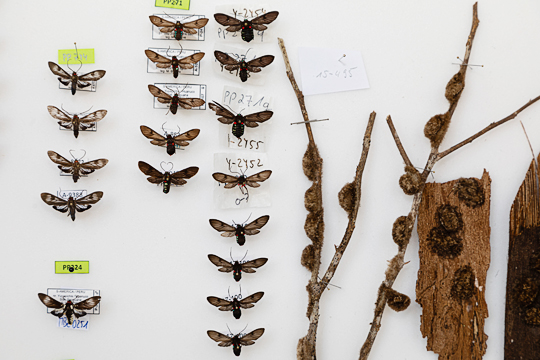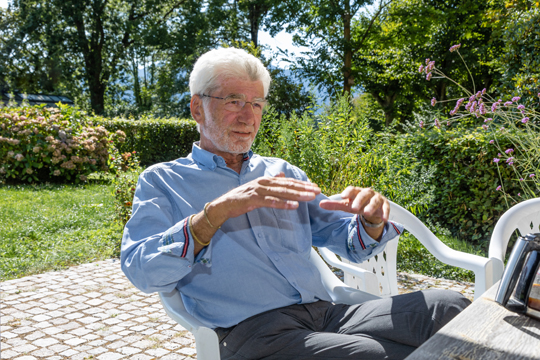“We can only protect what we know”
Freiburg, Oct 11, 2019
Almost every day, newspapers, magazines, and news programs are sounding the alarm: Word of the “insect Armageddon” is spreading. Numerous initiatives are being founded and laws are being passed, but what do we really need to do to stop the decline in insect populations? Michael Boppré, Professor of Forest Zoology and Entomology at the University of Freiburg, has been researching insects for more than 30 years. Eva Opitz talked to him about whether collecting insects is still ethically acceptable, why the decline in insect populations won’t be prevented through the use of less pesticides, and why protein-rich insects are not a solution for hunger crises.
 Small and inconspicuous, but ecologically very important. This insect collection contains specimens that lay people never see.
Small and inconspicuous, but ecologically very important. This insect collection contains specimens that lay people never see.
Photo: Ingeborg F. Lehmann
Mr. Boppré, your Chair in the department owns a large collection of tropical butterflies. Is it still ok to have an insect collection today?
Michael Boppré: Our collection consists of voucher specimens from research projects, so it’s not a collection for the sake of collecting, like the ones compiled by hobby collectors. Research collections are just as important today as they were 100 years ago. There is a huge number of species worldwide that we still don’t know about. We don’t just stick pins in insects and put them in a box; we also examine their morphology on a microscopic level.
What does that mean exactly?
We study structures for communicating within and between species as a way of acquiring information about their way of life. There are also lots of small and inconspicuous insects that play a huge role ecologically but are never seen by lay people. We scientists approach the collecting and killing of insects with great respect. We can only protect what we know.
There are lots of so-called butterfly houses advertised on the Internet that you can visit as a fun activity for the entire family. Is this still something we should be doing today?
In principle, butterfly houses are still a good thing. They give people of all ages the opportunity to experience living insects live and up-close. The houses import the chrysalises of butterflies from breeders in the tropics and exhibit the adult butterflies. This means the insects are not caught in the wild. Provided that the keepers take care of the butterflies in a way befitting the species, you can justify butterfly houses for their educational value. Even better is if they not only show the butterflies, but also inform people about their biology, the biodiversity of insects, and environmental protection.
Why is it usually difficult to keep insects?
Insects won’t tolerate being kept in poor conditions. A hen will still lay eggs in very small space. Insects are much harder to please than mammals. They need special nutrition, certain temperatures, a certain level of humidity, special lighting conditions, and the right location. This makes large-scale insect farming very work-intensive and expensive. Mass production isn’t even possible for most species because of the insects’ biology. This something that is often not understood.
 “Insects won’t tolerate being kept in poor conditions,” says Michael Boppré. Photo: Ingeborg F. Lehmann
“Insects won’t tolerate being kept in poor conditions,” says Michael Boppré. Photo: Ingeborg F. Lehmann
That may be, but people are talking more and more about eating insects as food, also in Europe. You can buy muesli bars enriched with insect protein in grocery stores now.
Insects will never be a basic food stuff for the very fact that it’s so difficult to farm them. Still, they continue to be a good food supplement and have been for thousands of years. When people in Asia smoke out wasps nests to eat the larvae, you could compare this to our Sunday roast. Insects can be harvested from nature sustainably, but only to a limited extent. Most species can’t be farmed in captivity, especially not to a large enough scale for them to become a basic food stuff. This means we won’t be able to solve future hunger crises with insects, even if they are much more environmentally friendly sources of protein than mammals.
When we talk about the insect Armageddon, pesticides are usually quick to follow. What role do they play?
We’re changing ecosystems radically and taking away the habitats of plants and animals, threatening their existence. Our large-scale farming concentrates on only a few crops, which harms all wild plants. This means that we also focus on the few insect species that have adjusted to these crops. They create huge populations that we then regard as infestations. I can understand farmers who don’t want to lose their harvests and insist on using pesticides. They have to reduce the harmful populations that they themselves helped to create. Biologically, a cornfield is dead for everything but European corn borers, which thrive unintentionally, a few lice, and one or two adversaries. Insecticides that are spread on large fields wouldn’t be able to harm other organisms if they didn’t get transported and didn’t stay active for such a long time. We can’t assume that banning pesticides alone will end the insect Armageddon.
So what should we do?
We have to protect plants, insects, and all animals and make sure they can survive by maintaining diverse habitats. We can only preserve and save organisms qualitatively and quantitatively if we ensure that there are habitats with natural diversity. Human land use should not exceed an ecologically sustainable limit, although this is already happening, and often. When I see the big sign in a field in Ebnet that says “Land Use Threatens Agriculture,” it’s clear to me that people still don’t understand how things are connected ecologically. We need more natural habitats. It may be important to talk about planting flowers along the roadside, about insect hotels and pesticides, but the core of the problem remains natural habitats. We have to look at our environment as a whole, and not just in little pieces.
Why have bees become a symbol for an agriculture gone wrong?
Our ancestors domesticated honey bees, and now we depend on them to spread pollen. Large-scale fruit orchards could never depend on natural insect populations to pollinate fruit. From an anthropocentric point of view, it’s essential that we protect and take care of honey bees. But bees are not typical insects; helping bees doesn’t mean helping other insects. Ecologically, you could even say that bees are perhaps bad for insect diversity because, outside of orchards, they compete with other insects who also depend on pollen and nectar. We can’t just focus on what we need, we also have to think of our fellow creatures. We have to make compromises.
In an article you wrote that was recently published in a book, you called for an Insect Welfare Charter. What would such a charter look like?
It can’t be written by scientists alone. We have to start a public debate about how we should look at insects overall and how we should think about them. In my opinion, we have to reconcile the purely anthropocentric approach that is so widespread with the principles of ecology. We would be taking a huge step if we would treat insects with more respect.

